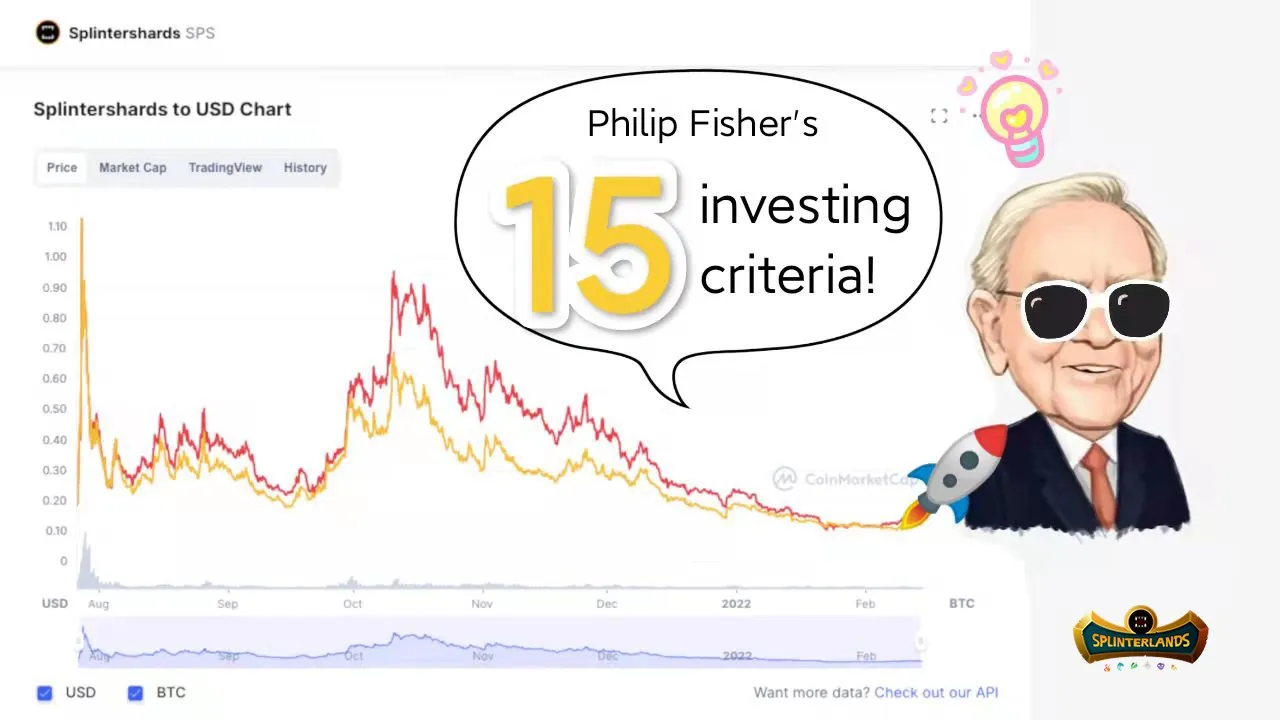
"Warren Buffett has repeatedly said that his investment style is 85% Benjamin Graham and 15% Philip Fisher."
1 - Does the company have products or services with sufficient market potential to make possible a sizable increase in sales for at least several years?
The Gaming industry was valued at $173.70 billion in 2021, and it is expected to continuously grow. In comparison, the Blockchain gaming market is today valued at $25.46 billion according to CoinMarketCap.com. This represents less than 15% of the entire industry. If giving real ownership over games' assets is the future of gaming, it will be up to Splinterlands to grab its fair share.

2 - Does the management have a determination to continue to develop products or processes that will still further increase total sales potentials when the growth potentials of currently attractive product lines have largely been exploited?
There are so many things coming into Splinterlands: The Modern Format, Lands, the SPS nodes, Promotional Cards, Riftwatchers... just to name a few. Projects and ideas in the pipeline are not what is currently lacking. The long-term view of the team makes me believe that they will end up delivering all those new features as long as we give them enough time to do so.

3 - How effective are the company's research-and-development efforts in relation to its size?
The team has been recruiting relentlessly since last August. And, over these last few weeks, many new members have been trained. According to the management team, this year 2022 should see major advancements thanks to the talented people who have joined the company. The Town Halls actually gave us a chance to see a few of those enthusiastic new employees, which is always a positive sign.

4 - Does the company have an above-average sales organization?
I do believe that @yabapmatt's is the heartbeat of this project. The economy he is currently designing is based on a long-term approach I appreciate. However, the cunning personality and business acumen of @aggroed make me think that the business side is in good hands. I'm not worried a bit about Aggroed actually sealing awful deals on behalf of Splinterlands.

5 - Does the company have a worthwhile profit margin?
In one of the recent Town Halls, Aggroed asserted that Splinterlands could go for 3 years without any other penny in revenue. This alone shows that their current revenue more than covers their annual cost. With the recent Chaos Legion General Sale, more cash than ever has been injected into the company. Even though part of it will be spent on Marketing, the overall financial health of the game doesn't seem to be an issue.

6 - What is the company doing to maintain or improve profit margins?
With the incoming shift towards Blockchain gaming, there is a massive change in the traditional profit margin's philosophy. The company is not trying to maximize its own profit margins but to share those with its players. This change shouldn't affect negatively the future of the game as long as the team gets enough resources to keep providing value. On the contrary, this new player-centred approach would probably reinforce the sustainability of the company as everybody will have skin in the game.

7 - Does the company have outstanding labour and personnel relations?
The company's culture seems to put its employees at the core. Listening to Hardpoint or Nate (@nateaguila), we can't help but appreciate the fact that they always try to give as much recognition as possible to their respective team. Another instance is their Support Team, which often is the fifth wheel of any company, but at Splinterlands, the management team actually empowers this department.

8 - Does the company have outstanding executive relations?
I love the transparency of the management team through their weekly Town Halls. It looks like there is a healthy degree of communication between all of them. Those weekly reports show that the team is willing to put themselves out there at the risk of being vulnerable. Ironically, this willingness of being vulnerable actually demands a great amount of courage, which we should all look for in any leadership board.

9 - Does the company have depth to its management?
Hardpoint taking over Yabapmatt's day-to-day technical development role is an example of the team's awareness to empower new strong leaders. This depth in the management team finally allows Yabapmatt to focus his effort on creating a sustainable environment, which will profit to everyone. Another example is Weirdbeard taking over the tournament side of the game, which will free up more time for Aggroed to grow the game outside of its current community.

10 - How good are the company's cost analysis and accounting controls?
To answer this question, I would refer to point No.5 above. While we don't have exact numbers regarding their costs, as a software company, the costs of running this kind of business are often minimal. Again, with enough funds for the next three years, we can assume that the team knows how to keep their costs at a manageable rate.

11 - Are there other aspects of the business, somewhat peculiar to the industry involved, which will give the investor important clues as to how outstanding the company may be in relation to its competition?
What personally attracted me to the game was its low cost of entry. While other games require hundreds or thousands of dollars right of the gate, Splinterlands only needs $10 to get started. Sure, to make further progress, investing more money into it is helpful, but being able to test the water at a low cost is undeniably a strong competitive advantage. Moreover, the fact that the game doesn't solely rely on bringing new players to make its economy work as a whole is also huge proof of its long-term approach.

12 - Does the company have a short-range or long-range outlook in regard to profits?
As I've mentioned several times along this analysis, the whole team has a long approach in terms of development. For instance, they are currently building reliable coding systems to make future developments more stable and faster to be done. They've also said a number of times that they didn't like to rely on short-term fixes. With countless new features to come, as long as those will bring value to the players, there is no reason why profits wouldn't follow.

13 - In the foreseeable future will the growth of the company require sufficient equity financing so that the larger number of shares then outstanding will largely cancel the existing stockholders' benefit from this anticipated growth?
Even though Splinterlands isn't a public company, let's assume that every asset in the game is a share of the company. With new players coming in and a pool of cards always shrinking due to their nature (cards are combined to level up, which reduce the number of copies in circulation), the current price of these assets, which are more or less twice their intrinsic value (burn value) for the cheapest cards, should be sustainable as long as the demand stays at least constant. Moreover, Yabapmatt's vision is to reward people who are constantly active in the ecosystem as he doesn't want to recreate a situation like Bitcoin where the first adopters are the only ones reaping the benefits.

14 - Does management talk freely to investors about its affairs when things are going well but "clam up" when troubles and disappointments occur?
I've rarely seen a team as transparent as the Splinterlands' team. Their weekly Town Halls always keep the players invested in the game up-to-date. They do not hide issues when they come up and share freely their successes but also their "failures" and "mistakes". Again, that kind of transparency is, to me, truly precious. That's the reason why they have such a strong community behind their project.

15 - Does the company have a management of unquestionable integrity?
One of the biggest current projects is the SPS nodes. The whole idea behind it is to hand over to players some control over the future development of the game. By doing so, they purposefully renounce keeping full control of everything themselves. Which kind of companies do that? They actually trust the community to do the right thing. In my honest opinion, this is evidence of great integrity.

By analyzing Splinterlands point by point through Philip Fisher's investment philosophy, I wanted to express the reasons why I so strongly believe in this project. Its huge potential combined with the singularity of the team behind its development are the main reasons for my daily commitment to this game, which is by the way far more than just a game to me.
"Spreading Peace, Freedom, and Prosperity."
@aggroed
If you've read this entire analysis to the end, thank you very much for your time. I hope I've made the time you've spent worth it!
Final note:
Of course, nothing in this post is financial advice. Please, make your own research.
See you in my next post!
Thomas
For new players interested in joining this amazing game, you can support me by using the following referral link (at no extra cost to you!):
https://splinterlands.com?ref=tt88
Thank you.